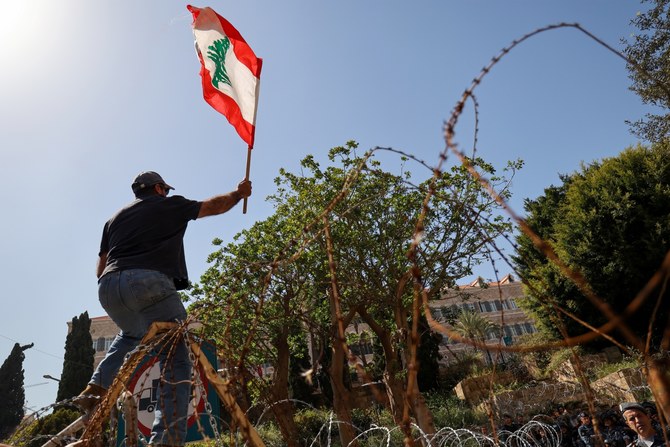Mohamed Chebaro
During a recent visit to Lebanon, I was alarmed to hear more talk that the only option left is for each community to run its own internal affairs. This would be a form of devolution, or decentralization, permitting each community or locality in this small country to govern its territories and people, including power generation, water distribution and some form of local security. It would be a snub to the ever-dysfunctional central state, its failing institutions and the corrupt elite dominating its affairs.
I was astonished to hear that some have been toying with the idea of seceding from the unruly elite and their regional backers in the hope of ensuring access to various amenities, such as water, electricity, fuel and bread, for the inhabitants of these self-styled cantons. Maybe services could be delivered at a price, moving away from the corruption, waste and shortages witnessed on the state level, where whole regions of the country have, for years, tended to excuse themselves from paying taxes or for the utilities they consume.
Pessimism is the name of the game in Lebanon. There is nothing to base any positivity on amid the current stalemate, where the country remains without an elected president, a prime minister and a working parliament. To some Lebanese, seeing the return of Syria to the Arab League is a sign that Lebanon’s political and economic stalemates might soon ease as a result of some form of regional settlement, especially if the Syrian refugees living and working in Lebanon are able to return to their country. But this and the unattainable dream of dividing the country are far-fetched and naive bets. Who says that the dominant force politically and militarily in Lebanon – that is Hezbollah and its allies – would condone such a demarche?
In the minds of some in Lebanon, the country’s uncertain existence goes back to the many failed attempts to constitute a nation state, as nothing has really evolved and provided permanence in terms of governability and stability since the creation of Lebanon, based on the infamous Sykes-Picot Agreement of 1916. This was when the French and the British carved up between them many parts of the Middle East that had been ruled for centuries by the Ottomans, placing them under a direct French or British mandate in preparation for their future self-rule. The Lebanese state that won independence in 1943 failed to cement a national identity and it needed a covenant brokered between its Christian and Muslim leaderships to creak through the first years of its existence. Then it survived a mini-civil war at the end of the 1950s, prior to feeling the full brunt of rising Arab nationalism and anti-Israeli alignment before succumbing to yet another civil war in 1975. This ended with a rejigging of the constitution and the old national covenant formula in the 1989 Taif Agreement. That deal, brokered by Saudi Arabia, redistributed power among the Lebanese based on parity between Christians and Muslims.
The Doha agreement of 2008, born from yet another stalemate, enshrined a new form of quasi-consociationalism, whereby nothing could be achieved short of a consensus among the forever conflictive ruling elites in the country. One group even managed to justify keeping its weapons independently of the national security apparatus, under the loose justification of resisting Israel. Parallel to the calls to divide the country, others have been calling for a review of the current Lebanese constitutional formula, which sees the power shared between Christians and Muslims.
For all its history, Lebanon has had a precarious political system in constant need of intensive care to hold it together. But the recent collapse of the value of its currency, the scale of the damage the country’s economy has suffered, its bankrupt state finances, its damaged banking system (once a jewel in the Lebanese economic crown), the near-nonexistent basic services, withering education system, and overloaded and starved healthcare system, to mention just a few adversities, all topped off by a lack of accountability, show that Lebanon has entered a long, dark tunnel that could lead to its extinction. The recent fortunate gas and oil discoveries in its national waters could offer the country a lifeline, but only if the corrupt ruling elite tame their greed and comply with calls to carry out major reforms that would see international organizations like the International Monetary Fund and the World Bank, in addition to regional donors, ready to help bail Lebanon out. But in the absence of legislation and the implementation of reforms crucial to its recovery from one of the world’s worst ever financial crises, Lebanon’s economy is sinking further into uncertainty. The Lebanese currency has already lost more than 98 percent of its value against the US dollar since 2019, leaving the country at the mercy of triple-digit inflation, which is spreading poverty and leading to waves of emigration.
With the continued intransigence of the ruling elite – which is blockading the political arena, holding the Lebanese hostage and showing no willingness to allow different players to find solutions to the country’s existential crisis – I cannot blame some Lebanese for thinking about desperate measures to preserve their existence and the well-being of their communities, even through embarking on futile ideas such as dividing the country. Lebanon, we were told long ago, is too big to be swallowed up by another country and too small to be carved up. But apparently no one would mind if it fails or if it ceases to exist. Lebanon has, since its inception, remained a creation unable to shield itself from regional discord or find consensus among its many people for an identity that unites them and could lead them to a more peaceful and prosperous future.







